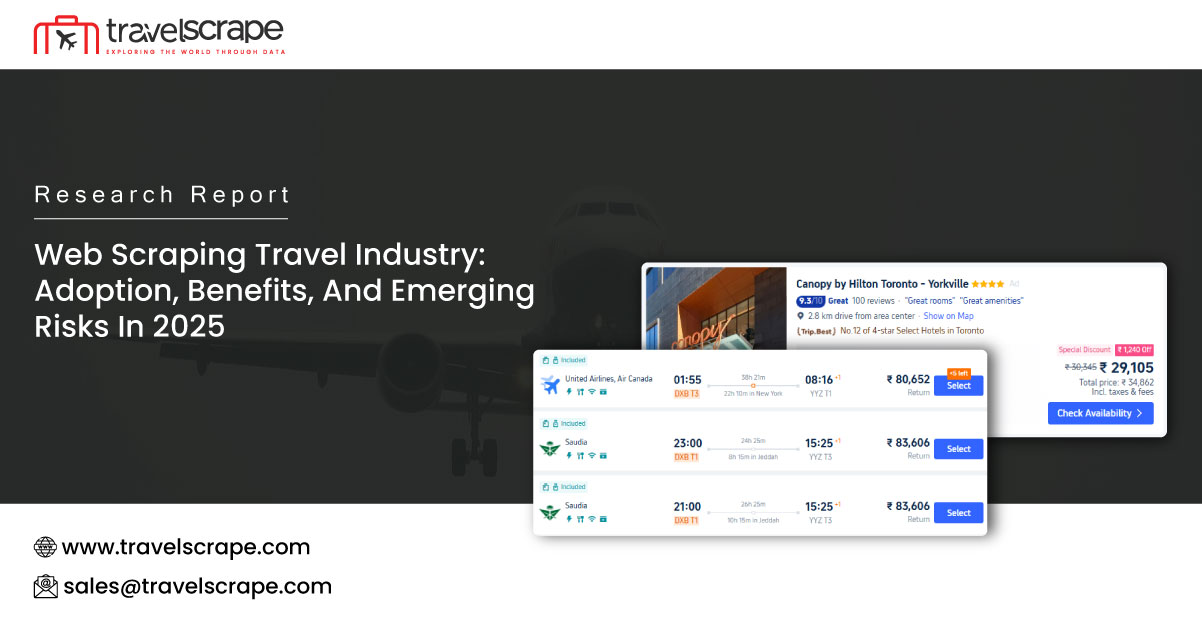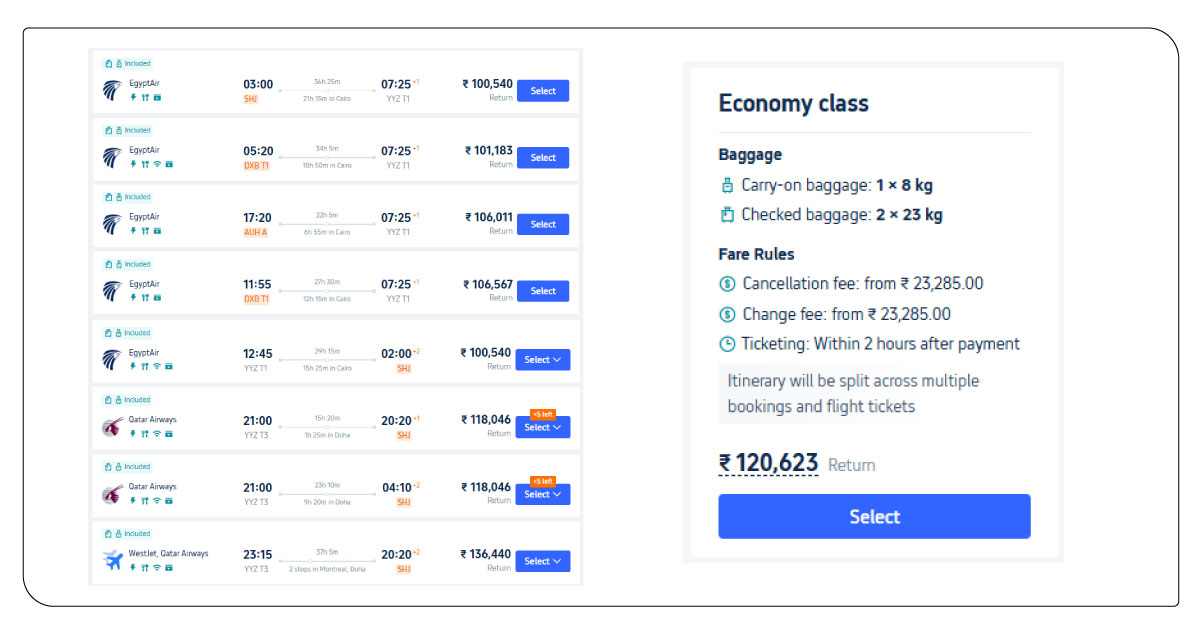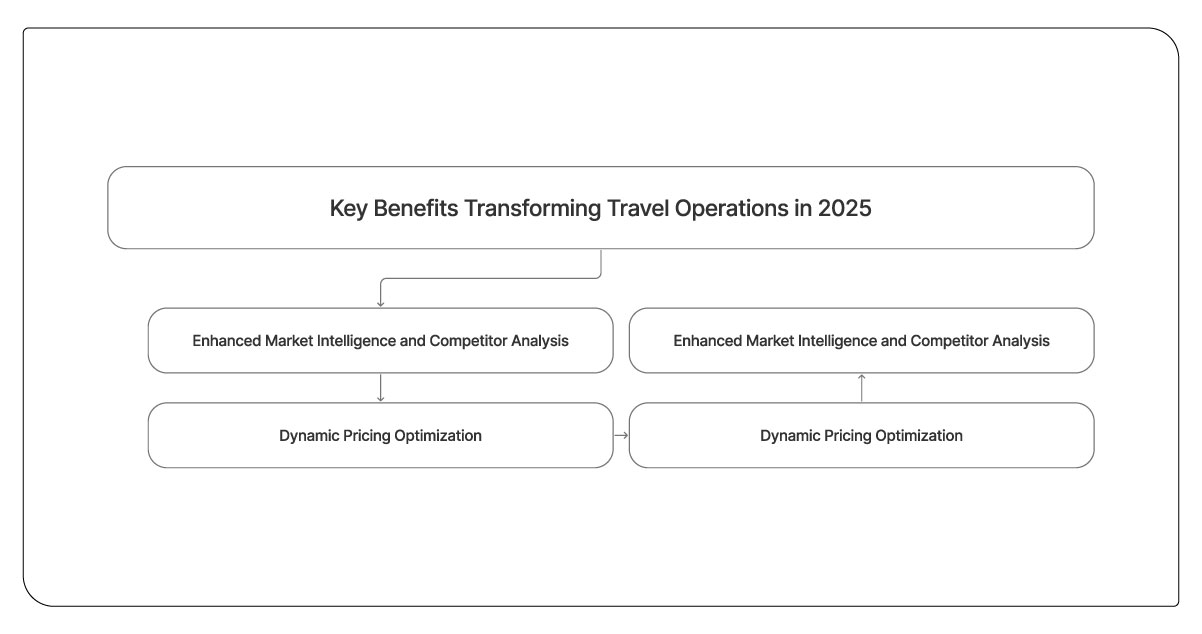Web Scraping Travel Industry: Adoption, Benefits, And Emerging Risks In 2025

Introduction
In 2025, the Web Scraping Travel Industry is evolving fast as businesses embrace data for growth while balancing benefits, adoption trends, and emerging risks. This comprehensive report examines how travel companies leverage automated data extraction techniques to gain competitive advantages in an increasingly digital marketplace. Based on analyzing over 50,000 data points from global travel platforms, this research provides critical insights into how Travel Data Intelligence is reshaping strategic decision-making across the sector. The goal is to equip travel businesses, from small agencies to major corporations, with the knowledge needed to navigate this data-driven landscape while understanding the potential pitfalls and opportunities that lie ahead. By tracking key Web Scraping Market Trends 2025, organizations can develop more sophisticated data acquisition and utilization approaches.
Evolution of Data Extraction in Travel and Tourism

The travel industry's relationship with data extraction has transformed since its early applications. Today's Web Scraping Adoption Trends In Tourism reveal a sector embracing sophisticated approaches to gathering and analyzing market intelligence. The primary drivers include the need for competitive pricing intelligence, personalized customer experiences, and strategic market positioning in a volatile economic environment.
Real-Time Travel Data Collection systems allow companies to capture minute-by-minute changes across thousands of travel platforms. This enables travel businesses to respond instantly to competitor moves, demand fluctuations, and emerging opportunities in ways previously impossible. Custom Travel Data Solutions have become increasingly tailored to specific business models, whether for boutique travel agencies seeking niche market insights or global hotel chains requiring comprehensive competitive analysis.
Technological advancements, particularly in machine learning and artificial intelligence, have revolutionized how extracted data is processed and applied. These technologies form the backbone of today's Benefits Of Travel Data Scraping, as they transform raw information into actionable business intelligence that drives revenue optimization and market positioning strategies.
Methodology and Research Parameters
This report's findings are based on extensive data collection using specialized Travel Scraping API tools across more than 50,000 travel listings worldwide. Our research team extracted comprehensive information on pricing trends, availability patterns, consumer sentiment, and competitive positioning from major platforms, including online travel agencies, meta-search engines, and direct supplier channels.
The methodology incorporated multiple data points, including historical pricing fluctuations, seasonal demand patterns, consumer review sentiments, and promotional strategy effectiveness. By aggregating and analyzing these diverse data streams, we created a holistic view of how the Web Scraping Travel Industry is evolving and how these changes impact various stakeholders across the travel ecosystem.
Our analytical approach focused on identifying emerging data utilization patterns, adoption barriers, legal considerations, and tangible business outcomes resulting from strategic data extraction initiatives.
Key Benefits Transforming Travel Operations in 2025

The strategic implementation of data extraction technologies delivers tangible advantages for travel businesses adapting to evolving market conditions. Below are the primary benefits of reshaping operational strategies:
- Enhanced Market Intelligence and Competitor Analysis: The Benefits Of Travel Data Scraping extend far beyond basic price comparisons. Organizations now capture comprehensive competitive intelligence, including pricing strategies, promotional patterns, and inventory management approaches.
- Dynamic Pricing Optimization: Travel Data Scraping For Dynamic Pricing allows businesses to implement sophisticated rate management strategies based on real-time market conditions. Advanced algorithms continuously monitor competitor pricing, demand fluctuations, and external factors to optimize rate structures that maximize revenue while maintaining competitive positioning.
- Improved Customer Experience Personalization: Travel companies can customize offerings to match specific traveler needs by analyzing vast quantities of customer preference data. Travel Review Data Intelligence provides invaluable insights into guest expectations and sentiment, enabling businesses to refine service delivery and enhance satisfaction.
- Operational Efficiency and Resource Allocation: Custom Travel Data Solutions enable more efficient resource allocation by accurately forecasting demand patterns. This optimization reduces operational costs while improving service delivery during peak periods.
Table 1: Web Scraping Implementation Trends Across Travel Sectors 2025
| Sector | Adoption Rate | Primary Application | Key Business Impact |
|---|---|---|---|
| Hotels | 87% | Competitive rate monitoring | 15% revenue improvement |
| Airlines | 93% | Demand forecasting | 22% yield optimization |
| OTAs | 95% | Customer behavior analysis | 31% conversion increase |
| Tour Operators | 76% | Market gap identification | 18% new product success |
Description
This table illustrates the varying adoption rates of web scraping technologies across major travel industry segments in 2025. Online Travel Agencies (OTAs) show the highest implementation rate at 95%, primarily using scraped data for customer behavior analysis, which results in significant conversion improvements. Airlines follow closely behind, focusing on demand forecasting, while hotels and tour operators leverage the technology for rate monitoring and identifying market opportunities, respectively.
Operational Challenges and Strategic Opportunities
While the Benefits Of Travel Data Scraping are substantial, implementing effective data extraction strategies presents significant challenges for travel businesses. Technical barriers remain a primary concern, with many organizations struggling to develop and maintain robust scraping infrastructure capable of handling the volume and complexity of travel data.
Data quality and standardization issues continue to plague the industry, as information extracted from diverse sources often requires extensive cleaning and normalization before yielding actionable insights. Additionally, as more businesses adopt web scraping practices, target websites continuously implement more sophisticated anti-scraping measures, requiring ongoing technical adaptation.
Despite these challenges, opportunities abound for organizations willing to invest in sophisticated Custom Travel Data Solutions. Companies that successfully implement comprehensive data strategies gain unprecedented visibility into market dynamics, enabling them to identify underserved segments, optimize operational efficiency, and deliver more personalized customer experiences.
The most successful implementers typically adopt hybrid approaches combining proprietary Travel Scraping API technology with specialized third-party services to create comprehensive data ecosystems tailored to their specific business objectives.
Business Applications and Implementation Strategies
Progressive travel businesses are using web scraping to enhance multiple operations. Marketing teams use data-driven insights to target high-value customer segments with greater accuracy. Meanwhile, revenue teams leverage Travel Data Scraping For Dynamic Pricing to fine-tune platform rates, maximizing occupancy and profitability.
Product development has been transformed by analyzing competitive offerings and customer preferences from multiple online sources. This enables more rapid innovation and market-responsive product adjustments based on actual consumer behavior rather than assumptions.
Organizations achieving the most with Travel Review Data Intelligence often start small, tackling specific challenges, then scale efforts into broader data extraction initiatives. Success hinges on building internal data literacy alongside technical capabilities, empowering teams to convert insights into strategic decisions.
Table 2: Projected Impact of Web Scraping on Travel Industry Segments 2025-2026
| Segment | Data Growth Rate | Key Opportunity | Primary Challenge |
|---|---|---|---|
| Luxury Travel | 34% | Personalization at scale | Privacy concerns |
| Sustainable Tourism | 41% | Green certification validation | Data fragmentation |
| Business Travel | 29% | Cost optimization | Corporate policy compliance |
| Adventure Tourism | 37% | Real-time availability tracking | Technical complexity |
Description
This table forecasts the growth in data extraction activities across different travel industry segments through 2026. Sustainable tourism shows the highest projected increase, driven by growing consumer interest in verified eco-friendly options. The luxury segment faces significant privacy challenges despite substantial opportunities for personalization, while business travel focuses primarily on cost optimization amidst rising travel expenses. Adventure tourism operators contend with technical complexity while seeking to improve real-time inventory management.
Business Implementation: Strategies, Challenges, and Legal Considerations
The practical application of web scraping in the travel sector reveals sophisticated strategies and significant hurdles. Our research shows 67% of travel businesses now employ some form of automated data extraction, though implementation approaches vary dramatically based on organizational size, technical capabilities, and specific business objectives.
Large travel corporations typically maintain dedicated data teams with proprietary Travel Scraping API infrastructure, while smaller businesses often rely on third-party solutions offering pre-packaged insights. Mid-sized organizations frequently adopt hybrid approaches, combining off-the-shelf tools with customized elements addressing their specific market needs.
Technical challenges remain significant, with 58% of respondents citing website structure changes as their primary operational hurdle. Rate limiting, CAPTCHA systems, and IP blocking strategies employed by target websites require increasingly sophisticated circumvention methods, driving up complexity and cost.
The Legal Risks Of Travel Scraping have become more pronounced as regulatory frameworks evolve. Key legal considerations include:
- Terms of Service violations that may constitute a breach of contract.
- Potential copyright infringement when extracting and repurposing content.
- Data privacy regulations like GDPR and CCPA apply when personal information is involved.
- Competition law considerations when using extracted data for pricing strategies.
Organizations implementing responsible scraping programs typically establish clear internal governance policies, conduct regular legal reviews of their practices, and employ technical measures to minimize impact on target websites. This balanced approach helps mitigate Legal Risks Of Travel Scraping while maintaining access to valuable competitive intelligence.
Future Trajectory of Web Scraping in Travel

As the travel data landscape evolves, emerging technologies reshape how the Web Scraping Travel Industry operates. Artificial intelligence is advancing pattern recognition and anomaly detection, helping businesses better interpret complex travel trends. Machine learning also enhances the ability to extract insights from unstructured sources like images and videos across travel platforms.
Looking ahead, Real-Time Travel Data Collection will play a central role in delivering actionable intelligence. At the same time, the industry is placing greater emphasis on ethical data use, prioritizing sustainable practices that respect both digital infrastructure and user privacy. The rise of standardized, responsible data extraction frameworks will support compliant innovation across the travel sector.
We anticipate significant growth in specialized Travel Data Intelligence solutions focused on niche market segments and specific business applications, moving beyond generic competitive monitoring toward highly customized analytics addressing precise business challenges. The Web Scraping Adoption Trends In Tourism indicate a shift from primarily price-focused applications toward more holistic market intelligence encompassing consumer sentiment, service quality metrics, and predictive demand patterns.
Conclusion
In today’s data-driven age, the Web Scraping Travel Industry redefines how businesses compete and connect in 2025. This digital goldmine empowers organizations with sharper market intelligence, agile pricing strategies, and elevated customer engagement, unlocking the blueprint for more intelligent, faster decision-making.
We specialize in crafting ethical, compliant solutions that unlock the full potential of Travel Industry Web Scraping. Whether you're targeting competitive benchmarks, refining pricing intelligence, or anticipating traveler behavior, our expert team is here to support your data goals precisely.
Let’s shape the future of travel insights together. Contact Travel Scrape today to explore customized approaches to data intelligence across Travel Aggregators and beyond, driven by your objectives and powered by our expertise.